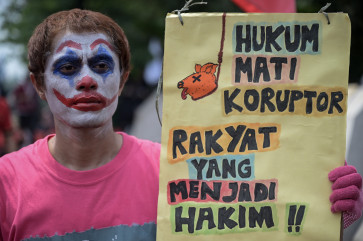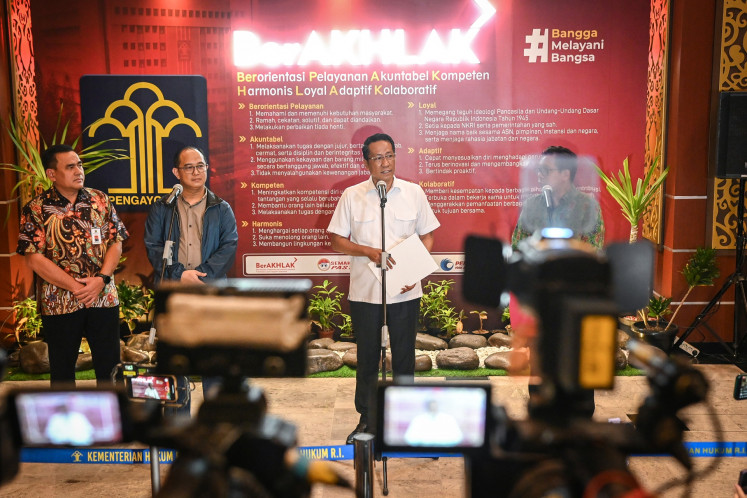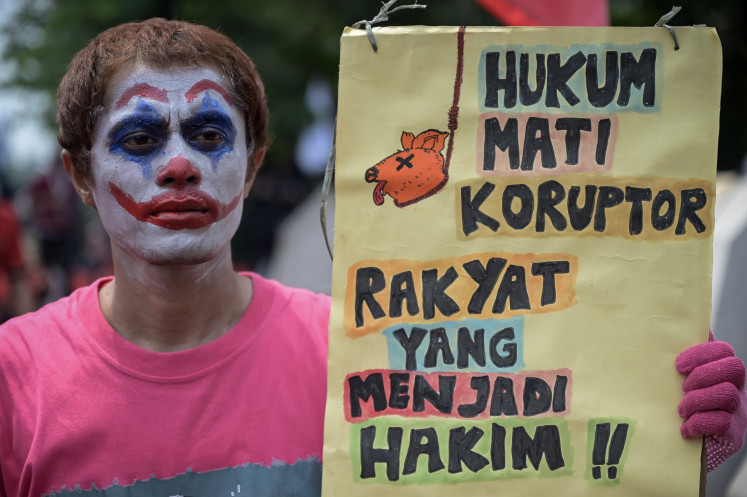Popular Reads
Top Results
Can't find what you're looking for?
View all search resultsPopular Reads
Top Results
Can't find what you're looking for?
View all search resultsAs another International Anticorruption Day comes by
Developing countries of the world reel under the curse of corruption
Change text size
Gift Premium Articles
to Anyone
D
eveloping countries of the world reel under the curse of corruption. Real progress in improving governance and reducing corruption seems to be slow and hard to come by.
In 1957, Indonesian vice president Mohammad Hatta observed with concern, “Corruption runs riot throughout our society; corruption has infected a great many of our government departments.” Hatta went on to say, “Workers and government employees, whose wages and salaries are no longer adequate for their daily needs, are being exploited by enterprising adventurers who want to get rich quickly.”
What the wise leader said 65 years back is sadly true even today not only of Indonesia but also of many nations of the world.
The late Indian prime minister Rajiv Gandhi in frustration bemoaned that out of every rupee spent by the government of India for development only 15 percent reaches the beneficiaries. Decades later, only a small percentage of money spent by the government would actually still get past the leakages in the system.
Apart from distorting the economy, breeding poverty and perpetuating injustice, corruption has yet another evil side to it.
Most organized crime like drug trafficking and human trafficking, forest and wild life crimes, illegal mining and fishing operates and is sustained through corruption. Corruption is a threat to public order and national security. Even terrorism is known to pay its tribute to the corrupt in order to thrive.
So what should be done? To solve any problem one has to invest in countering it. When Hong Kong turned from a severely corrupt to a reasonably honest country, it invested heavily in setting up its anti-corruption machinery.
It today spends .03 percent of its GDP in fighting graft that works to US$15 per capita per year according to Tony Kwok who worked as Deputy Commissioner of Hong Kong’s Independent Commission against Corruption (ICAC). With this kind of investment, Kwok claims, “Even big countries can turn the tide against corruption in three years flat.”
Institutions matter. The way anti-corruption agencies are designed is crucial; do they have operational autonomy, how is the leadership selected, what about its budget, how much political backing it has, are all vital determinants of performance and effect.
Further on, having institutions whose only business it is to fight corruption is important. Institutions like KPK (Corruption Eradication Commission) of Indonesia are what we need. Piling on the work of corruption eradication on institutions like the Police or Attorney General’s Office above their normal work of policing or prosecution may not be optimal.
These multiple responsibilities could have them take their eyes off the ball on corruption, which is after all only “one” of the issues they handle. One organization, one mandate, one result is what is needed. In these days of branding, a strong recognizable agency is what would be effective.
However, a centralized structure with small staff strength is hardly enough to check corruption in a vast country. Smaller KPKs in provincial capitals would help take the fight against corruption to the different corners of the country.
Let us however not forget that a weak criminal justice system cannot sustain effective anticorruption. Police, prosecution, courts and the prisons together constitute the four pillars of a criminal justice edifice of a nation. Weakness even in one affects the whole rule of law structure.
There is no point in having, an excellent investigation agency, putting up cases before a corrupt or slow moving court system. If an accused can manage to delay sentence and also go on appealing, each taking several years, then that is subversion of justice. And this is what the powerful corrupt with their battery of shrewd lawyers do.
Corruption wins here. Prison systems that are lenient with parole or commutation of sentences or even pardons do not help either. They destroy deterrence. And this promotes impunity.
Therefore, there is a need to work on the criminal justice system as a package to improve the fight against graft.
It is not the business of the government alone to fight corruption. Everyone is affected and therefore every one must get involved. Civil society, press, religious institutions, universities and the people have an equal or bigger role. All over the world, non-government is edging out the government as the leader in this fight.
In India one witnessed recently the people led by civil society pushing a reluctant government to act on a law to establish an anticorruption body (Lok Pal). This was a game changer.
The enactment of a Right to Information Act and its widespread use by civil society to fight corruption and enforce accountability was another such game changer in India. Several such game changers are needed in the long battle against corruption.
In Indonesia the anticorruption agenda is championed and strengthened by the CSO’s and the media. Whether it is in challenging the government or holding public servants accountable or educating the public and creating a public opinion, the role of the non-government is crucial.
As another international day against corruption comes by on Dec. 9, it is time for everyone to renew and rededicate with greater vigor and commitment to the fight against corruption.
The writer is country manager of the United Nations Office on Drugs and Crime, Indonesia. The views expressed are his own.










